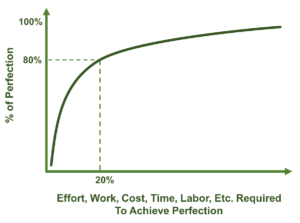Lazy people unite!
I’d like to offer a slightly different take on The Pareto Principle and The Law Of Diminishing Marginal Utility. Ugh, I know, but I promise this little tome is not your father’s econ class. You’ve heard these terms, maybe even kind of applied them in your professional life, and you’ve probably seen the shape of this graph before. What’s different is how I’ve labeled the graph.
Take a moment to think through the implications of this graph. I taught this observation to my daughter as she agonized over a school project. She has the tendency to be a perfectionist, so a dark cloud hung over the Ross home going into the weekend (project due Monday). Knowing her, she will have achieved “A” level work by
Another family application of the 80-20 principle is LAWN MOWING. Being an 80-20 kind of guy, I am content to MOW on Saturday morning and be done with it. My lovely bride, however, likes the yard to be EDGED and TRIMMED along the fences and sidewalks. I would posit that MOWING gets me 80% of the way to my wife’s idea of a good lawn-mowing job with 20% of the effort…and that the edging and trimming and blowing and sweeping, all the nice touches to a well-kept lawn cause me 80% more work, but only makes the lawn 20% prettier (and thus her happier). So, we compromise. I’ll mow every week and edge once every two years. I only make her out to be a
Silly examples, sure, but this principle can have
Consider the impact of a perfectionist boss on an employee when the boss demands perfection in everything, critical tasks as well as non-critical tasks. There are plenty of activities in an employee’s daily work life that do not need perfection.
On the flip side, consider the process that is critical, but is so scripted, so Byzantine that it is impossible to comply with. As a result, employees make a good effort at first, but over time give up…and the process is skipped entirely. Here’s a staggering example of a process involving child safety that was so bureaucratic that the process didn’t get done. Period. A large youth sports organization once had a volunteer vetting process that involved lots of hoops and phone calls and voice mail cycles, and then corporate approvals before the volunteer coach was approved. The process was so long, so
Do you have any policies at work causing needless extra work? How about a policy requiring getting three competitive bids for all expenditures over $100? Do you have to sign off on a bunch of invoices that one of your employees could easily handle, but the amount is a little past their signature authority?
In your own professional life, in what areas have you needlessly demanded perfection of yourself, just because that’s your genetic make-up? Working on that Powerpoint presentation until the
Do you have a truly mission-critical process that absolutely must be executed flawlessly every time, but you’ve set yourself up for misery because the process itself is overwhelming?
Does your strive for perfection in every aspect of your professional life cause you to be out of balance personally? Does it drive your employees insane? I hope the chart above, with its new
If you’d like to chat about a process that has been gnawing at you lately, please email me at bob@highlandross.com.

